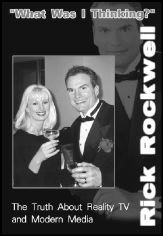RICK ROCKWELL
Comedy Underground, 222 S. Main, 628-0303, $12 8:30 p.m. and 10:30 p.m. Sat., July 6
“This is not Tonya Harding doing Shakespeare,” Rick Rockwell says about his stand-up comedy act. “This is something I’ve always done. I made over a million dollars writing, speaking, and telling jokes, so how bad could it be? I mean, really?”
Rockwell talks repeatedly about “writing, speaking, and performing,” as though they were all part of some incredibly savvy business scheme that you, too, can have if you call an 800 number in the next 10 minutes. He co-wrote the 1978 cult flick Attack of the Killer Tomatoes. He’s a motivational speaker (his PR bio says “His corporate performances leave people raving about him for weeks and months around the water cooler”). He’s been doing stand-up for decades. And, oh, yes, he was the guy who volunteered to go on television and wed a complete stranger on Fox TV’s notorious “reality programming” Who Wants to Marry a Multimillionaire?.
The television stunt—which finished with his bride, 34-year-old nurse Darva Conger, ditching him on the (unconsummated) honeymoon, filing for divorce, and posing for Playboy in (what else?) a bid to assert her strength and independence—could have been Rockwell’s best joke ever. Unfortunately, he meant it.
“My thing is just, I set out on a grand adventure,” he explains. “And I ended up in a house of mirrors.”
It’s a purely American story, a dark comic satire that resulted in, among other things, the public emergence of some “bogus 10-year-old restraining order b.s.” by an ex: He angrily released the air from her car tires “just to get her attention. It was a stupid, immature, dumb thing to do. It doesn’t mean I’m a domestic abuser, for crying out loud.”
Rockwell knows the whole situation sounds bizarre to the average person wondering what the hell he was even thinking in the first place; helpfully, he has a new book titled, What Was I Thinking?
Rockwell uses a lot of analogies. Metaphors are big, too. So are hypothetical situations as examples (one imagines Darva as the lead in a role-reversal Who Wants to Marry a Supermodel?).
On the phone, the guy is friendly and exceedingly polite; one note of dubiousness in a question about the Conger affair is all it takes to set him off on a rising wave of explanation. He’ll answer the question, and offer to supply the accompanying supporting documents. He swears that “to a person” many people can back him up. His voice, though mostly quite level, in full passion has somewhere in it the sound of a hunted man that no one’s hunting anymore. It’s no surprise to dial him up and discover that “the party you called does not accept calls from blocked numbers.” He talks a bit like a conspiracy theorist—not unbalanced by any means, but like a man who is convinced he stumbled onto something awful and it means a lot to him to get you to see it, too.
“I knew that the chemistry was gonna be a long shot,” he says of the show and his choice of Conger from 49 other willing brides. (She wooed him with “I’ll be your friend, your lover, and you’ll never be bored.”)
“I certainly was gonna give it my best effort because, to me, there are 6 billion people on the earth, and somehow, in some weird way, my path led me to this show,” he explains. “And I thought, ‘This must be what I’m supposed to do,’ ’cause everything in my life was actually perfect at the time that I did the show: I made $120,000 working about five days a month, writing, speaking, and performing, and it cost me $94 to do it. I had a beautiful house with an ocean view in La Jolla.”
Rockwell swears he was dead serious (you believe him), Conger was not, and it was back to picking up the pieces after the media onslaught. Which, naturally, meant writing a book called What Was I Thinking? and heading out on a comedy “Annulment Tour.” But he does not riff on Conger or the Fox show during his act, he says—at least not until he’s established himself with the audience as a solid comic.
“As people file out,” says the man who spent his 15 minutes as a media-created joke, “They’ll tell you—to a person—’Wow, you were funny as hell, and you’re not anything like we thought you’d be like.’ That’s what I’m there for. I’ve always liked doing stand-up comedy, but I’ve always loved making people laugh.”









